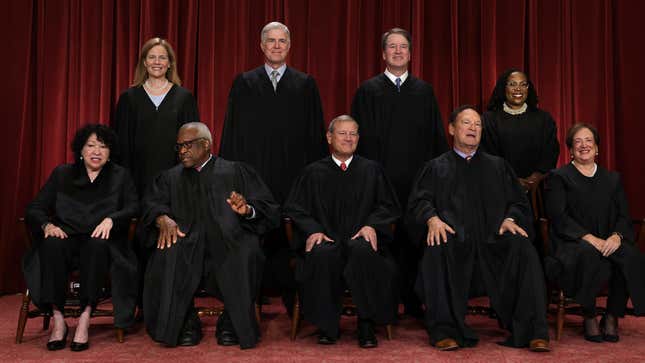9 Unelected Justices Will Decide on Financial Fates of Millions With Student Debt
The Supreme Court heard two cases arguing the legality of a Biden administration program to cancel up to $20,000 in student debt per person.
Politics

The Supreme Court heard oral arguments for two cases challenging President Biden’s student loan forgiveness program on Tuesday, as the justices prepare to issue rulings that could decide whether tens of millions of Americans qualify for up to $20,000 of their student debt to be forgiven. The first case, Biden v. Nebraska, involves a coalition of Republican-led states arguing Biden’s administration doesn’t have the authority to erase thousands in student debt. And the second, Department of Education v. Brown, questions whether students excluded from Biden’s policy have the standing to sue the administration, and whether Biden’s plan is legal as a whole.
Last summer, Biden announced that his administration would forgive $10,000 of federal student debt for borrowers who make less than $125,000 per year (and $20,000 for those who received Pell Grants)—somewhat fulfilling a key promise he made on the 2020 campaign trail. At the time, he also announced an extension to the freeze on federal student loan payments. Both cases challenge not just Biden’s plan, but also his administration’s repeated actions to pause student debt collection throughout the pandemic—as people weren’t able to work and struggled to pay a range of bills.
Throughout Tuesday’s oral arguments, the justices’ comments implied they may vote along ideological lines. Conservatives questioned the “fairness” of the program to others who have paid off their debt: “Why was it fair to the people who didn’t get arguably comparable relief, not maybe that their interests were outweighed by the interests of those who were benefited or they were somehow less deserving of solicitude,” asked Justice Samuel Alito, who’s memorably quoted an English jurist who favored burning witches at the stake. (Some context: The cost of attending a four-year public institution increased by roughly 15-fold in the last 50 years, while the minimum wage plummeted.)
In response, Justice Sonia Sotomayor argued there’s an “inherent unfairness in society because we’re not a society of unlimited resources,” while Justice Ketanji Brown Jackson questioned, “whether or not the same fairness issue would arise with respect to any federal benefit programs.”
-

-

-

-

-

-

-

-

-

-

-

-

-

-

-

-

-

-

-

-

-

-

-

-

-

-

-

-

-

-

-

-

-

-

-

-

-

-

-

-








































